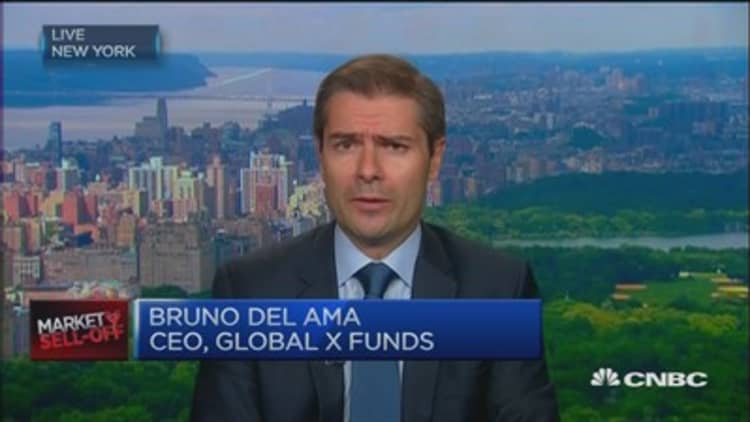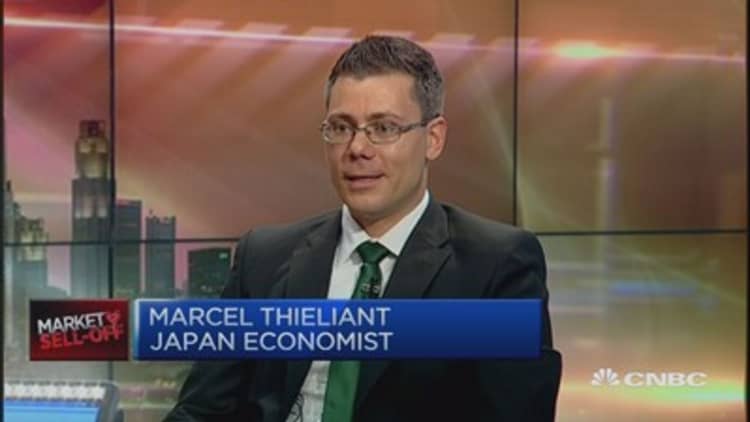The mayhem in Chinese equity markets showed no signs of abating on Tuesday, with the benchmark index accelerating its downfall in the final hour of trading to settle below the key 3,000 mark.
Japan's Nikkei 225 index was the second-biggest laggard in the region, closing down 4 percent, after turning negative in the afternoon trading session. Earlier in the session, the Tokyo bourse had staged a comeback, alongside most of the other regional stock indices, on the back of bargain hunting in beaten-down stocks and as the Dow Jones Industrial Average futures opened up more than 100 points Monday evening in the U.S.
Overnight, major U.S. stock indexes slumped almost 4 percent each, after a near 9 percent dive in Chinese equities elevated nervousness about economic activity and demand prospects in the world's second-biggest economy. The S&P 500 lost 3.94 percent to end formally in correction territory, while the and closed down 3.57 and 3.82 percent, respectively.
China takes another battering
The Shanghai Composite index lurched violently lower in the last hour of trading to eventually close down 7.63 percent at 2,965.1. The finish below the critical 3,000 level marks the index's lowest level since December 2014.
A substantial number of blue-chip heavyweights fell by the daily maximum allowable of 10 percent on Tuesday, including property developers Poly Real Estate and Shanghai Shimao, as well as brokerage houses such as Citic Securities and Haitong Securities. Securities firms were down by the daily limit for the second consecutive session.
Shares of Shanghai-listed PetroChina, the nation's biggest company by market value, also slumped 10 percent.
Among China's other indexes, the blue-chip CSI300 index and the smaller Shenzhen Composite tumbled 7.1 percent each. In Hong Kong, the key Hang Seng index tracked the rapid downturn in its mainland peers to drop 0.5 percent..
Read MoreChina growth panic is way overdone, experts warn
In the previous session, the Shanghai bourse nosedived nearly 9 percent to chalk up its biggest one-day percentage loss since 2007, leading state media Xinhua News Agency to describe the tumultuous trading session as "Black Monday."
Analysts attributed the market slump to an erosion of faith and confidence among investors, particularly overseas traders, in Beijing's ability to prop up share prices. "Chinese regulators have enormous resources and tools to normalize the market [but] investors are very disappointed with the policy responses from China thus far. There is a sense that the government responses have been unorthodox, ineffective and unhealthy for the long term functioning of the Chinese capital markets," Bruno Del Ama, CEO of Global X Funds, told CNBC's "The Rundown."
According to IG's market strategist Bernard Aw, there is no easy explanation for the meltdown in the mainland markets, which indicates that significant downside risks remain.
"Some blamed it on the yuan devaluation and the Chinese [factory activity] readings. Some said the broader conditions of slowing global growth, falling commodity prices and deflation risks dragged equities down. They could all be right," Aw wrote in a note issued late Thursday. "But I feel that the lack of clarity on what was the trigger for the stock slump makes it difficult to get a sense of the market - this suggests that the selloff could still have some room to go."
From a technical perspective, the Shanghai bourse will likely see a temporary support level at 2,800 points, according to independent technical analyst Daryl Guppy. However, in the long run, the key stock index may head down to the next support level of 2,400 points.

Nikkei skids 4%
Japan's benchmark Nikkei 225 index made a U-turn in the afternoon session and eventually closed at a six-month trough, pressured by selling among European investors, according to Reuters.
Mirroring the reversal in the benchmark index, the Topix index also fell back into the red, ending down 2.7 percent.
Also weighing on the bourse was a swing back to the 119 level in the dollar-yen, sparking risk-off sentiment in export-oriented counters. Toyota Motor, Nissan, Suzuki Motor and Honda closed down between 3.5 and 4.2 percent. Construction equipment maker Komatsu eased 4.4 percent, while electronics makers Panasonic and Sony closed down 4 and 0.3 percent, respectively.
Earlier in the day, Japanese Finance Minister Taro Aso warned market players against pushing up the yen too much further, saying that its spike against the dollar overnight was "rough" and undesirable for the economy.
Weaker oil prices overnight put a chokehold on energy producers. Showa Shell Sekiyu tanked 4.2 percent, while Inpex and JX Holdings lost 2.4 and 3.7 percent, respectively.

ASX jumps 2.7%
A sharp rebound in banking and mining counters lifted Australia's S&P ASX 200 index out of the red. Earlier in the morning trading session, the Sydney bourse touched a fresh low since July 2013, after widening losses rapidly from 0.4 to 1.4 percent within minutes from the market open.
"It has been a roller-coaster morning on the Australian stock market... however the mood quickly lightened as U.S. stock futures bounced back strongly and Chinese exchanges clawed back some of their initial losses," analysts from Patersons Securities wrote in a note.
Westpac led the charge in the banking space, up 4.9 percent, possibly on the back of bargain hunting and short-covering. National Australia Bank, Australia and New Zealand Banking and Commonwealth Bank of Australia gained between 3.6 and 4.6 percent.
Oil plays also came off intra-day lows, with Woodside Petroleum and Oil Search closing up 0.8 and 1.6 percent, respectively. Santos inched down 0.4 percent.
Ahead of the release of its full-year results, shares of BHP Billiton erased a lower open to bounce up 2 percent. In other corporate news, Pacific Brands and Amcor surged 15.6 and 4.3 percent, respectively, after upbeat full-year earnings.
Read MoreNorth, South Korea agree to ease recent tensions: Yonhap
Kospi gains 0.9%
South Korea's Kospi index swerved back into positive territory following choppy trading, while the junior Kosdaq index widened gains to 5.2 percent, as tensions along the Korean peninsula eased.
Hefty buy orders for carmakers Hyundai Motor and Kia Motors underpinned the rebound; both stocks soared 3.5 and 4.9 percent, respectively. Chipmaker SK Hynix, which announced plans to spend 31 trillion ($24.94 billion) to build two new chip plants in South Korea, closed up 7.9 percent.
Refiners also made a comeback on Tuesday, with S-Oil and SK Innovation advancing 3 and 1.5 percent respectively, after falling more than 2 percent at the open.
Read More12 records hit in the global market selloff
Rest of Asia
Taiwan's weighted index closed up 3.6 percent, recouping slightly more than half of Monday's steep decline which took the Taiex index down to a three-year low at the close.
According to Reuters, expectations that the government would soon step in to shore up market confidence propelled the bourse on Tuesday.
In Southeast Asia, Singapore's Straits Times index erased a dismal to close 1.51 percent higher. On late Tuesday, a statement from the government said that the country's parliament has been dissolved, a sign that an announcement on the date of the general election is imminent.
Indonesia's Jakarta Composite closed up 1.56 percent, breaking a five-day losing streak, while Malaysia's FTSE Bursa Malaysia KLCI index managed to close 2.08 percent higher, after seeing near 2 percent losses earlier in the session. Thailand's benchmark SET index finished the day 1.75 percent higher.

